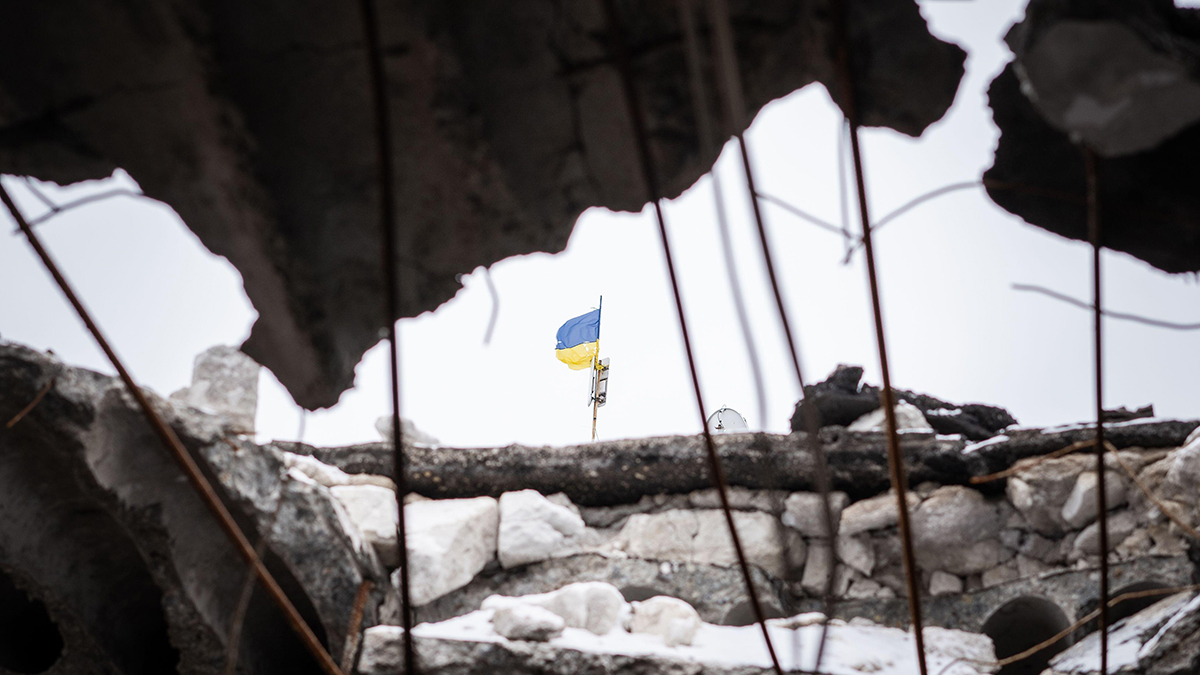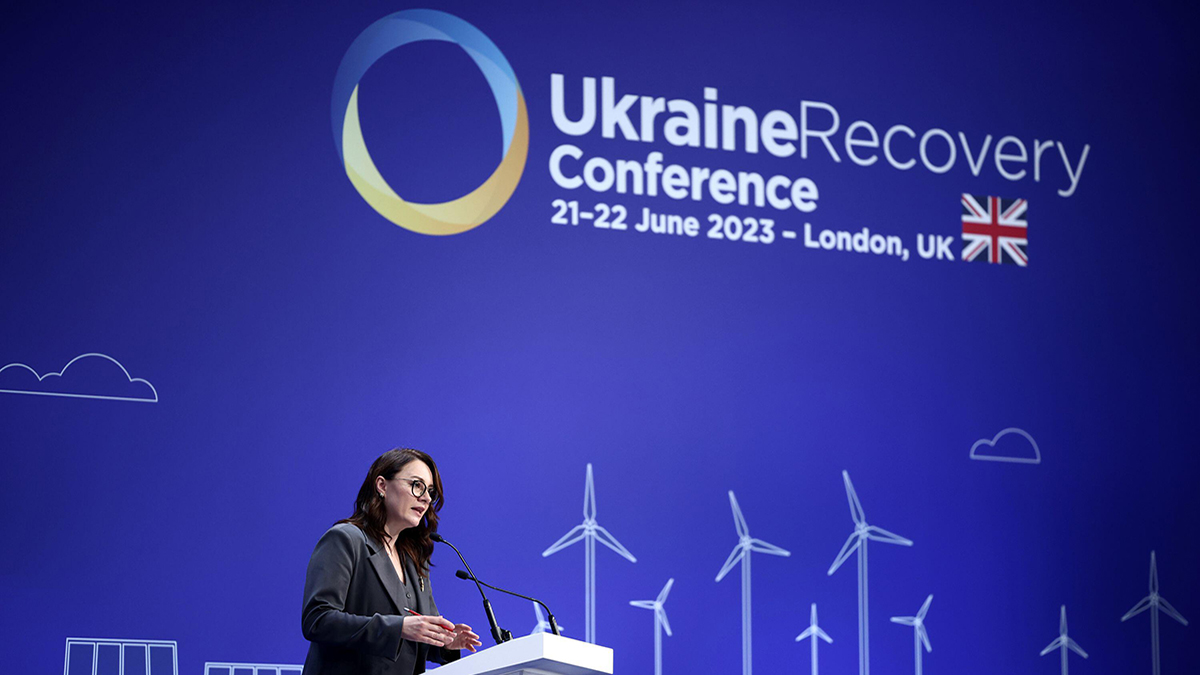Ukraine appeals to re/insurers to bolster private investment
Ukraine has laid out a 10-year roadmap to transform itself from a warn-torn country in Europe into an economic powerhouse on the global stage
Re/insurers willing to support that vision have a clear entry point, UkraineInvest’s chief executive, Sergiy Tsivkach, says
UkraineInvest, the Ukrainian government’s investment promotion agency, has so far unlocked nearly $4bn in foreign direct investment and is supporting 17 investment projects worth more than $2bn. The re/insurance sector can help unlock billions more, according to Sergiy Tsivkach, UkraineInvest’s chief executive.
In an interview with Insurance Day, Tsivkach describes UkraineInvest as a “one-stop shop” where investors and insurers are matched with projects. UkraineInvest is not a charity distributing aid, he stresses, but a platform offering business opportunities on a scale not seen in Europe since the end of the Second World War.
Insurance must play its crucial role, he continues, in unlocking the capital Ukraine sorely needs. Its GDP shrank more than 29% year on year in 2022 but is expected to grow 2% this year. Inflation was nearly 27% but, as of June this year, it was down to 12.8%.
“We have received significant budgetary support from our international partners of nearly $60bn, but we are lacking investment in the private sector and so we need to create an effective market for private insurance and for war risk insurance as important conditions for businesses to operate in Ukraine,” Tsivkach says.
Trade insurance is another important part of that effort, he adds. “At the start of the war, some companies were putting contracts on hold, even though the facilities of Ukrainian and international producers were not damaged, just to be on the safe side. We have been encouraging them to stop doing that and some have reinstated their trade, but if there were more trade insurance available then more trade would follow.”
Before the war
Ukraine had a burgeoning insurance sector before Russia’s invasion in February 2022 and the first shoots of a reinsurance market were appearing. There were 155 insurance companies with about €1.5bn ($1.66bn) in assets under management, but their number had fallen to 140 by July 2022. Total premiums signed in the first half of 2022 fell by one-third year on year.
Tsivkach accepts that some re/insurers will be hesitant about returning to the Ukrainian market, let alone entering for the first time. “Insurers and reinsurers should base their decision on analytics, not on media reports because these give the impression Ukraine is a fully red zone,” he says. To that end, he continues, the government is working on “zoning” the country in terms of risk exposure for investors and insurers.
Tsivkach urges re/insurers to be “proactive” in creating demand. “We understand it isn’t an easy exercise for a company to approach international finance organisations, but they can easily approach us at UkraineInvest,” he says.
“We can consolidate the interest we receive and pass it along to the Ministry of Economy and to our international partners, to mobilise and speed up the process of building the re/insurance market in Ukraine. We can act as a one-stop shop for this because we have all the data to hand.”
A good model for re/insurers, Tsivkach says, is the recently announced collaboration between Aon, Lloyd’s and Vienna Insurance Group (VIG) to provide enhanced re/insurance capacity in order to bolster Ukraine’s economic resilience and support the country’s recovery and reconstruction.
“I am appealing to the many more re/insurers throughout the world to come to us because the more players like Aon, Lloyd’s and VIG there are, the better it will be for developing a market here.”
A good signal
In 2022, the National Bank of Ukraine produced its first report on reinsurance, according to which outward reinsurance business halved in the first half of that year compared with the same period of 2021. In money terms, that was a drop to about $14m. The share of outward reinsurance of total insurance premiums decreased from 19% to 13% in the same period.
Notably, the split between Ukrainian residents and non-residents in outward reinsurance flipped from 60% and 40% to 15% and 85%.
The fall in reinsurance was a logical result of uncertainty created by the war, Tsivkach says, as some companies were concerned they and their clients would become insolvent. “I hear from many international companies and institutions that they have been surprised by how the majority of Ukrainian companies have been making their loan repayments during the war. No one is trying to get a free ride and that is a good signal to investors and insurers, who can hear not just from us but from international bodies how Ukrainian companies are performing towards their financial commitments.”
“I am appealing to the many more re/insurers throughout the world to come to us because the more players like Aon, Lloyd’s and VIG there are, the better it will be for developing a market here”
Sergiy Tsivkach
UkraineInvest
Poland’s Kuke, an insurance company authorised to provide export insurance backed by that country’s treasury, has continued covering commercial risks in Ukraine throughout the war to date.
“Kuke says it is surprised by the level of claims, which has been very low, even during the war, and lower even than the same coverage for contracts with some G7 countries,” Tsivkach says. “This is a reflection of the commitment of Ukrainian businesses to protect their reputation and to do their utmost to ensure their operations are successful so insurance is not triggered on their commercial contracts.”
Big names
It is this attitude to business, Tsivkach continues, that has encouraged global brands to continue investing in Ukraine. Kingspan, Carlsberg, Bayer, Nestlé, Cersanit and CRH Group are among the companies with multimillion-dollar projects via UkraineInvest. “These companies could definitely be at the top of the list for any insurance company, to talk to them and assess the possibility of working with them,” Tsivkach says. “In addition to these, we have projects worth $2.3bn in the pipeline.”
Time is of the essence, he stresses. “A greenfield project in any country needs 12 to 18 months for the planning process alone, but this costs less than 1% of the total investment of a project and while you’re planning you have no physical risk.
“At the same time, you can create a portfolio of investment projects for insurance companies and the more companies that plan projects, the more clients there will be for insurers,” he says.
The risk that insurance will be triggered is “minimal”, he adds, because many of the companies that are planning projects in Ukraine will physically start to implement them “only when conditions allow”.
Companies do not have to be based in Ukraine to invest in or to insure projects, he continues. Moreover, UkraineInvest provides its service free of charge on behalf of the government of Ukraine. “Investors and insurers can be in New York, London, Brussels, Berlin, wherever and work with us on finding sites and obtaining licences in preparation for the reconstruction of Ukraine,” Tsivkach says.
Companies with a local presence will, however, “have priority” in terms of access to the country’s public procurement process. Having a presence in Ukraine would thus be a strategic decision for them to make, Tsivkach says.
As much as 65% of investments in Ukraine is being used to buy equipment, he adds, so there is a “huge opportunity” to create new leasing companies, which will need insurance against war risk. That would help unlock the country’s economic development, he says, because Ukrainian and foreign companies would be able to pay 20% upfront to a leasing programme and not need to find 100% of the cost of the equipment they need.
URC2023
At the Ukraine Recovery Conference (URC) held in London last month, Tsivkach moderated a panel discussion examining investment opportunities and derisking mechanisms to encourage private finance in Ukraine.
The event hosted a series of pledging announcements, all against the sobering backdrop of the World Bank’s estimate that every month of war adds $10bn to Ukraine’s reconstruction bill, which is already nearing $420bn.
 The panel discussion Sergiy Tsivkach moderated at the Ukraine Recovery Conference
The panel discussion Sergiy Tsivkach moderated at the Ukraine Recovery Conference
URC2023 sent a strong message, Tsivkach says, that the international donor, finance and investment communities are willing to work on projects in Ukraine, but they need better co-ordination – with Ukraine and between themselves. They also want to see more active engagement by the private sector in terms of demand for private insurance, he adds.
Separate to but aligned with this effort is a war risk insurance scheme aimed at helping businesses invest in Ukraine. Announcing the initiative at the conference in London, British prime minister Rishi Sunak said a lack of insurance options that cover war-related losses is preventing a vital flow of private investment into Ukraine.
To kickstart the scheme, the UK and Japan have committed £20m ($25.7m) and $23m respectively to the Support for Ukraine’s Reconstruction and Economy (Sure) Trust Fund. The fund is managed by the Multilateral Investment Guarantee Agency (Miga), a member of the World Bank Group that provides political risk insurance (guarantees) for projects in a broad range of sectors.
Tsivkach also highlights the statement of intent signed at URC23 by the European Bank for Reconstruction and Development (EBRD) and other international organisations on relaunching the private insurance market in Ukraine, by developing a guarantee facility.
Tsivkach says: “We spoke to the EBRD about six months ago about Ukraine’s inability to export goods as it used to and it has done a great job – it has developed a programme to insure goods in transit.”
Government action
Since URC2023, UkraineInvest has received five more project applications, which it will submit to Miga and the US International Development Finance Corporation. In addition, French, German and Italian export credit agencies (ECAs) have expressed interest in Ukraine but want to see more projects, Tsivkach says.
To help meet demand such as this, the government of Ukraine is working to alleviate legal and regulatory restrictions on business. For example, the national bank has eased martial law currency restrictions that apply to certain cross-border loans, through recent amendments to resolution No. 18.
It is expected these changes will enhance new financing to Ukrainian private business with the participation of ECAs and foreign sovereign-related creditors. Tsivkach says this means Ukrainian companies will be able to service their foreign loans “without any issues”.
Another example he gives is the Ukrainian parliament’s adoption in May of Bill No. 9015, which allows the country’s own ECA to insure the investments of Ukrainian and foreign companies in Ukraine against war risks.
Tsivkach says Poland is amending its law on state-guaranteed export insurance to protect the investment and capital of Polish entrepreneurs in Ukraine. It is hoped, he adds, the amended law will be passed as early as this September.
BlackRock and JPMorgan Chase are helping the Ukrainian government set up a bank – the Ukraine Development Fund (UDF) – to steer public seed capital into reconstruction projects that can attract hundreds of billions of dollars in private investment. The UDF is not expected to launch fully until the end of the war. Tsivkach says: “This will mobilise capital, but we will need a clear and robust strategy on how to invest money from the fund and how to combine it with state incentives. That strategy should come from Ukraine, in consultation with our international partners.
“Due to Russia’s illegal war against Ukraine, the global insurance industry is not providing large-scale insurance services to meet the demands of private business in the country, because of the risk of insolvency is not allowing them to calculate their premium effectively.”
New insurance schemes and tools are needed, he adds, which is why Ukraine's economy ministry is developing a risk data exchange platform to enable insurers and investors to assess military risks in Ukraine.
Ultimate support
UkraineInvest started receiving dozens of investment applications soon after it received EU candidate status in June 2022, Tsivkach says. Nato membership will be equally important for Ukraine’s economic develop, he adds, particularly for regions that border Russia and are therefore even more exposed to security risks.
The long-term Ukraine security package announced by members of the G7 at the Nato summit earlier this month was a “good result”, Ukraine’s president, Volodymyr Zelenskyy, said, but an invitation for Ukraine to join Nato would have been “ideal”.
Ukraine has wasted no time in responding to the EU’s promise of “predictable support” in the form of a €50bn Ukraine facility for 2024 to 2027, announced by European Commission president, Ursula von der Leyen, at URC2023. The first of the facility’s three pillars is financial support in the form of grants and loans to the state. For this to be disbursed, Ukraine will need to prepare a plan, in consultation with the European Commission, detailing its vision for recovery from the war.
The second pillar is a Ukraine Investment Framework designed to attract and mobilise public and private investments in Ukraine’s reconstruction by providing guarantees and blended finance – a mix of loans and EU grants – in support of the “Ukraine Plan”. The third pillar is technical assistance and other supporting measures normally available to EU pre-accession countries.
Ukraine’s economy ministry has already set to work on the Ukraine Plan, Tsivkach says, and has announced more than 10 sectoral working groups will be created. Those sectors are energy, agriculture, green industry, critical materials, healthcare, education, security, IT, entrepreneurship, and construction. “The programme will make Ukraine an economically strategic country in Europe, producing products for countries throughout the world,” Tsivkach says.
The size of the task is huge, however. For example, the war has damaged half of Ukraine’s metallurgy sector. The iron and steel industry alone contributed about 10% of the country’s GDP in 2021, accounting for one-third of its export revenue and employing about 600,000 people. “Metallurgy, military tech, transport, manufacturing – these could all offer employment options for the Ukrainian defenders when they come back to their normal civilian lives,” Tsivkach says.
Asked about the media headlines of a “Green Marshall Plan” for Ukraine, he says the US programme helped 16 countries in Europe recover after the Second World War, whereas Ukraine has the support of more than 50 countries from around the world. Tsivkach adds: “I don’t think there will be a duplication of the Marshall Plan but rather a duplication of the idea. That means a combined pool of funds and a plan for Ukraine’s transformation, not simply back to its pre-war condition, but into a green economy.”
The country is hardly starting from scratch, he stresses, saying it produces more than 180,000 engineering graduates a year.
“Don’t think of investing in Ukraine as being charity,” Tsivkach concludes. “Think of Ukraine as a profitable project and plan your investment now.”



